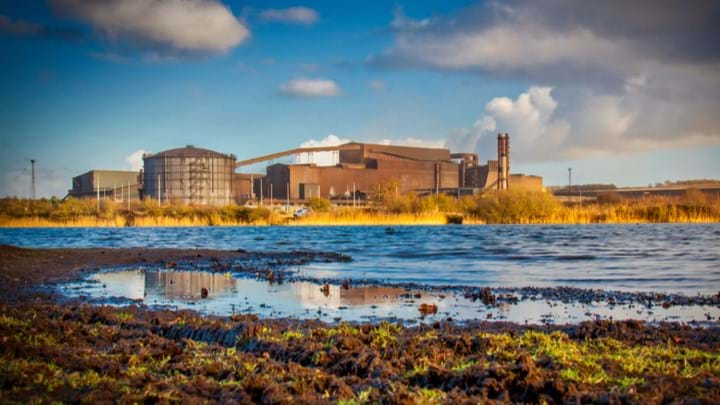UK government ‘confident’ coke supply will keep Scunthorpe blast furnaces running while importing ‘whatever is available’

THE UK government is “confident” the supply of coke over the coming days will be sufficient for British Steel to continue operations at the Scunthorpe blast furnaces it took control of over the weekend.
On Monday morning it had been feared that the Scunthorpe plant would run out of coke and iron ore. Coke is the essential fuel in smelting iron ore to make steel. Switching off the blast furnaces could damage their structure as cooling iron would harden.
However, later in the day, two shipments of coke were confirmed to have arrived into the port of Immingham in Lincolnshire, around 30 miles from Scunthorpe. The government also expects another shipment to arrive “in the coming days”.
Produced from a blend of specific types of coal, coke has not been made in the UK since March 2024 when Tata Steel closed the country’s last remaining coking plant in Port Talbot in South Wales. UK steel production has since relied entirely on imported coke.
Chris McDonald, a Department of Energy Security and Net Zero parliamentary private secretary and Fellow of IChemE, told TCE that in the short term he expected the government to import “whatever is available” as they try to stabilise British Steel’s commercial operations.
The government has accused British Steel’s Chinese owner Jingye of selling off coke and iron ore after the company announced plans to close the UK’s two remaining blast furnaces in Scunthorpe last month, putting 2,700 jobs at risk. On Saturday, the government passed emergency legislation to bring the business under its control. Long-term ownership of British Steel has not yet been finalised, although the government has not ruled out renationalising it.
British Steel also has beam mills in Lackenby and Skinningrove in Teesside which are now under state control.
McDonald, who previously held roles as CEO of the UK National Steel Innovation Centre and the Materials Processing Institute in Teesside before becoming the Labour MP for Stockton North, said in parliament on Saturday: “It is really important to realise that steel companies do not operate in a free market, and if we ask our steel companies to do that, we’re asking them to compete with national governments overseas.
“And we’re letting national governments overseas set out steel policy, our industrial policy, and fundamentally our defence policy as well.”
In a video posted to his social media channels later that day, McDonald added that Jingye hasn’t “behaved in good faith” and that it was time “for the government to intervene”.
‘Continuous innovation’
The steelworks at Scunthorpe have four product lines, making what McDonald described to TCE as “incredibly high-quality products” such as fine wire used to make tyres and steel beams for high-speed railways. In his speech to parliament, he said that “members might not be aware that [of] the steels we’re producing today, two-thirds of them didn’t exist 15 years ago”, and that this represents the “continuous innovation in the steel industry”.
In the longer term, McDonald told TCE that he wants the Scunthorpe steelworks to “move to the point where we can invest in clean production” of steel. He told parliament he hopes the government can do this “with the most modern, most efficient, and most high-productive steel plants.”
Shortly after the remaining blast furnaces in Port Talbot, owned by Tata Steel, ceased production last year, the government invested £500m (US$661m) to build an electric arc furnace (EAF) in their place. EAFs are far more energy efficient than blast furnaces, producing virgin-like metal by smelting existing steel, but require a smaller workforce.
Going green
Other figures have also used the crisis at British Steel as an opportunity to call on the government to invest in EAFs. Shaun Spiers, executive director of the Green Alliance think tank, said: “Scunthorpe can be at the heart of a thriving green steel sector.
“We have the opportunity to pivot to electric arc furnaces, supported by investment and a transition plan, to safeguard thousands of jobs and meet the growing demand for cleaner steel.”
Ben Houchen, the Conservative mayor of Tees Valley, said last Friday: “The government will soon decide where investment goes – and Teesside is ready. We’ve got the permissions, the grid, the land, the workforce, and the will to build a new electric arc furnace.”
In February, the government launched a consultation to assess how to invest £2.5bn earmarked to help the UK steel industry grow, with a focus on the importance on decarbonisation. The government is expected to publish its “steel strategy” in the coming months.
Recent Editions
Catch up on the latest news, views and jobs from The Chemical Engineer. Below are the four latest issues. View a wider selection of the archive from within the Magazine section of this site.




